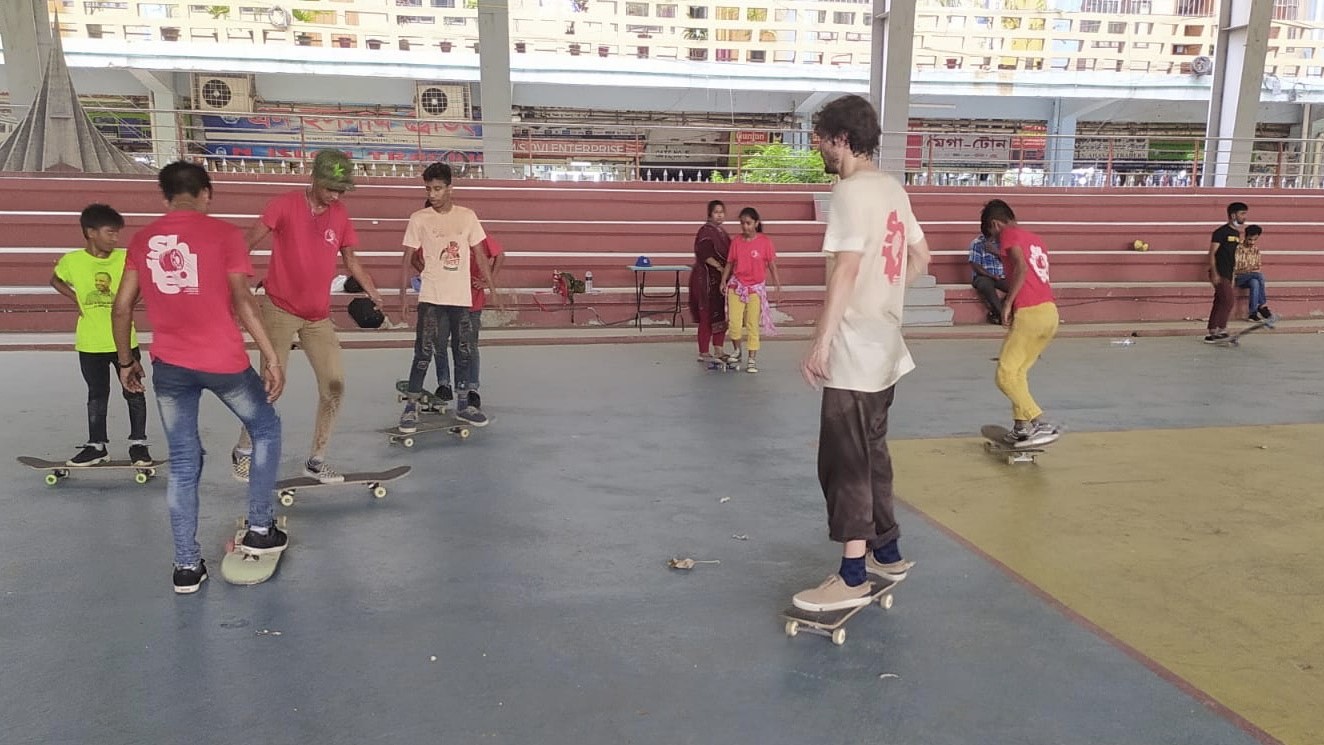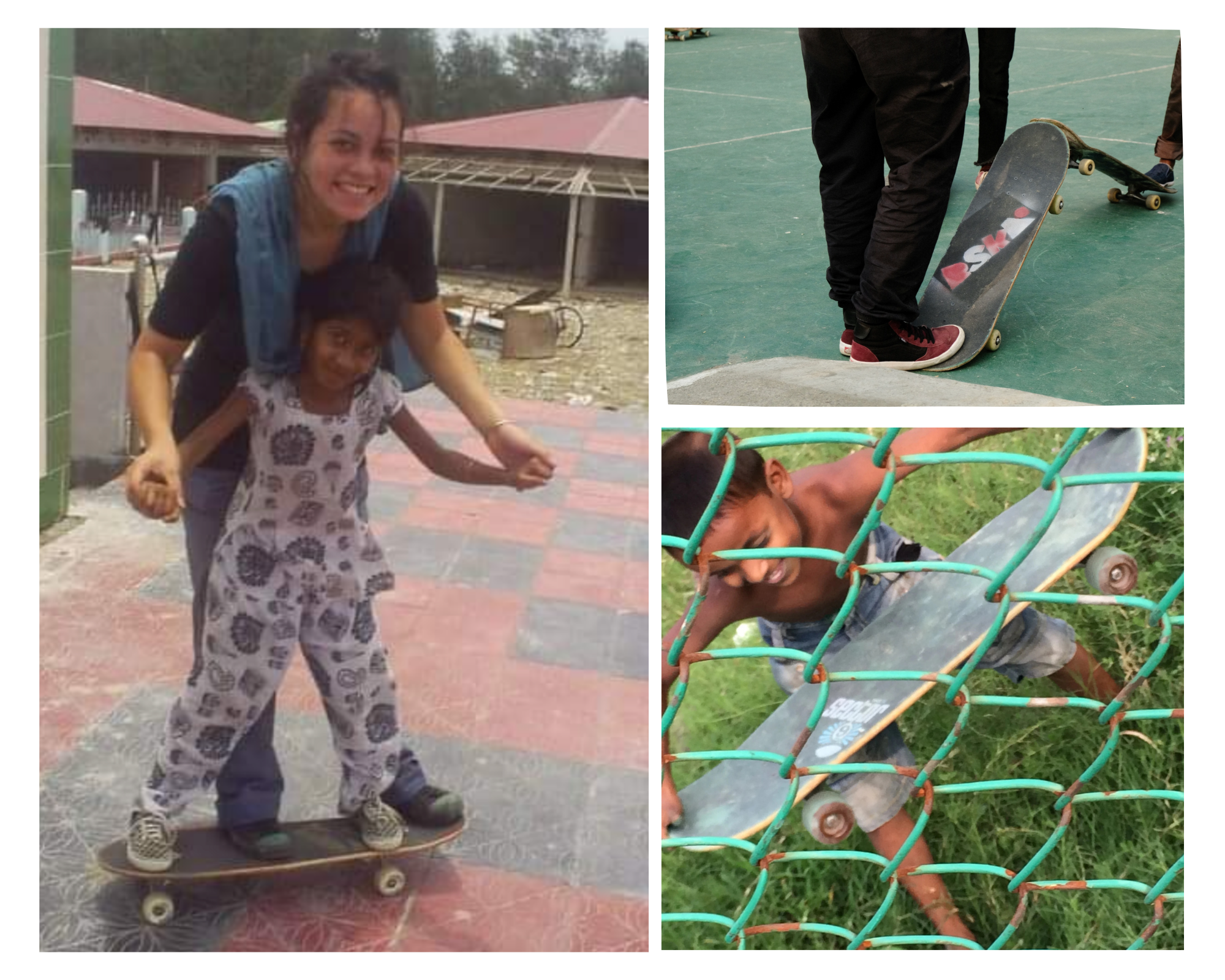
Country
Bangladesh
Organisation
Bangladesh Street Kids Aid (BSKA), Skateistan, Bangladeshi Girls Shred
Key Words
Girls’ empowerment, skateboarding, Bangladesh, gender equality, Gender Based Violence (GBV) prevention, youth resilience.
Authors
- Bangladesh Street Kids Aid (BSKA), Dhaka & Cox’s Bazar, Bangladesh.
- Skateistan, International NGO supporting grassroots social skateboarding. Areas of work: Child protection, girls’ empowerment, informal education, gender equality, youth development, GBV prevention.
Summary/Overview
Bangladesh Street Kids Aid (BSKA), in partnership with Skateistan, runs Bangladeshi Girls Shred —a skateboarding and creative education program for street-involved and marginalized youth in Dhaka and Cox’s Bazar. The program provides safe spaces for girls and boys to learn, play, and build resilience while tackling gender inequalities such as child marriage and school dropout. With a strong focus on girls’ empowerment, BSKA trains and employs female coaches, integrates psychosocial support, and promotes leadership development. By combining play, education, and mentorship, BSKA is reducing GBV risks, improving confidence and skills, and shifting harmful gender norms in urban Bangladesh.
Problem Statement
Bangladesh is home to one of the largest child populations in South Asia, but millions of children live in extreme precarity, particularly those in urban centers like Dhaka and Cox’s Bazar. Street-involved youth often beg, work informally, or become entangled in crime and drug abuse simply to survive. Girls face particularly acute challenges. Poverty and patriarchal norms contribute to one of the highest rates of child marriage in the world — 51% of Bangladeshi women are married before 18, and nearly 18% before age 15. Adolescent girls from low-income families are pressured to leave school early, enter unsafe labor markets, or accept early marriage as the only path available.
In Cox’s Bazar, home to both local impoverished communities and large refugee populations, risks are further compounded by displacement, exploitation, and lack of access to education or safe play. For girls, public space is heavily restricted by social norms, and recreational opportunities are virtually non-existent.
Against this backdrop, the absence of safe, inclusive, and supportive environments perpetuates cycles of inequality and exclusion. Girls and young women urgently need access to programs that provide mentorship, education, and opportunities for leadership, while tackling the structural barriers that expose them to violence and deny them their rights.
About the Programme
Bangladeshi Girls Shred (BGS), run by Bangladesh Street Kids Aid (BSKA) with Skateistan’s support, is a community-based initiative using skateboarding and creative education to empower street-involved children and adolescents, with a strong focus on girls. The program operates in Dhaka and Cox’s Bazar, reaching children aged 5–18 who are at risk of child marriage, school dropout, or engagement in unsafe street economies.
At its core, BGS provides daily skateboarding and informal education sessions five days a week. Sessions integrate literacy (Bangla and English), creative arts, and life skills with structured skateboarding lessons. Nutrition, hygiene, first-aid, and psychosocial support are also provided, ensuring holistic care for participants who often lack access to these basic needs. With their no-school, no skateboarding policy, participants have an extra motivation to go back to school.
A central innovation of the program is its leadership pipeline for girls. Female participants who are aging out of the programs are trained to become coaches and employed in steady jobs as role models and mentors. Through structured leadership training, trauma-informed coaching, and international certification, these women are building professional skills and economic independence. Their visibility challenges gender norms, proving that girls can lead in public and sporting spaces.
The program directly addresses early-childhood pregnancy by:
- Offering safe, female-led spaces for recreation and learning.Reducing risk of child marriage through mentorship and alternative role models.
- Building self-esteem, leadership, and peer solidarity among girls.
- Providing alternatives to unsafe labor, sexual exploitation or street involvement.
By normalizing girls’ presence in skateboarding and education spaces, the program shifts community perceptions. Girls gain confidence, literacy, and leadership experience, while boys learn respect and cooperation in inclusive environments.
In short, BGS is more than play: it is a pathway to gender equality, resilience, and opportunity for some of Bangladesh’s most marginalized girls.
Outcomes
In 2024, BSKA engaged 290 children regularly across Dhaka and Cox’s Bazar, with 36% being girls. Weekly attendance averaged 181 participations. In the first semester of 2025, the average weekly attendance reached 385 (49% being girls’ participation), and the number of regular children engaged increased to 401, of which 41% are girls, showing the positive trend of female inclusion at BSKA programs. Among participants, currently 200 are displaced youth.
Program surveys and observations show improvements in literacy, self-esteem, and school attendance motivation. Girls report higher confidence in public spaces, and parents increasingly delay or reconsider early marriage plans due to program engagement.
The four female coaches have become powerful role models, with younger girls citing them as inspiration to continue schooling and pursue leadership roles.
Community attitudes are also shifting — girls skating publicly, once unthinkable, is now celebrated at events like Go Skateboarding Day and the annual All-Girls Skate Competition. Evidence shows reductions in child marriage risk and increased participation of girls in decision-making spaces.
Successes
- Empowering female coaches with steady employment and international training opportunities has proven transformative. They are now community leaders, breaking cycles of inequality.
- Girls’ visibility in skateboarding has challenged restrictive norms, fostering pride and acceptance among families.
- Events like the annual BGS Graduation & Skate Competition showcase girls’ skills publicly, cementing skateboarding as a tool for empowerment.
- The program provides holistic support (food, hygiene, psychosocial care) alongside play, addressing multiple vulnerabilities at once.
Challenges
- Monsoon season disrupts skate sessions due to flooding, limiting consistency. BSKA is exploring indoor and sheltered facilities to mitigate this.
- Deeply entrenched social norms still pressure girls toward early marriage and restrict movement. Continuous community sensitization is required.
- Limited financial resources constrain program expansion, particularly in Cox’s Bazar where demand is high among both local and refugee populations.
- Staff capacity is stretched — ongoing training and wellbeing support remain priorities.
Lessons & Recomendations
From the experience of BSKA’s Bangladeshi Girls Shred, the following key lessons emerge:
- Girls need female role models in leadership. Employing former female participants as coaches not only prevents early marriage but also creates a powerful cycle of inspiration and empowerment for younger girls.
- Play is an effective entry point for gender equality. Skateboarding breaks down barriers, builds confidence, and normalizes girls’ presence in public life in ways that traditional interventions often cannot.
- Holistic support strengthens impact. Nutrition, hygiene, psychosocial care, and education — when combined with recreation — address the interconnected vulnerabilities of street-involved children.
- Community buy-in is essential. Parental and community engagement, through public events and visibility of girls’ successes, is crucial to shift norms and reduce resistance.
- Flexibility is key. Programs must adapt to local realities like monsoon disruptions and resource constraints. Building partnerships and diversifying funding can increase sustainability and reach.
Recommendation: Social and recreational programs worldwide should integrate girls’ leadership development, holistic care, and public visibility strategies to maximize impact on gender equality and GBV prevention.
References
Skateistan Annual Reports: https://skateistan.org/transparency
UNICEF, Child Marriage in Bangladesh: https://www.unicef.org/bangladesh/en/child-marriage
Skateistan Partners Model: https://skateistan.org/partnerships
BSKA Social Media: https://www.facebook.com/BSKAID/

